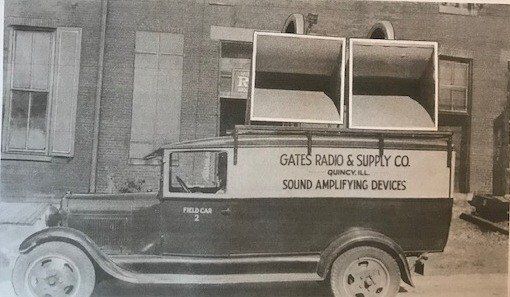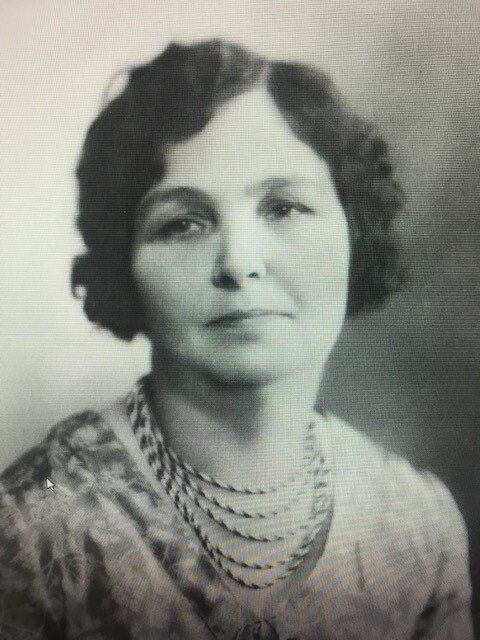The Gates Radio Company. 1935, A Challenging Year

This remote amplifier truck is parked in front of the 115 N. 4th Street business. The truck was hired to provide sound and music at events, often in South Park in Quincy. (Photo courtesy of the author)
Henry Gates, Parker’s father, died unexpectedly September 4, 1934. Parker, with the support of his wife and mother, was now running the business.
In 1935, radio stations across the country were feeling the effects of the Depression. Sales had slowed, causing a financial crisis for the company. Parker was discouraged. Again, the question: “Will the Gates Radio Company survive?”
There was a ray of hope. WTAD Radio, in existence in Quincy since July 8, 1925, announced it was going to purchase additional broadcast equipment. Gates submitted a bid for his company.
He found out that WTAD’s manager, Walter Rothschild, and some others were meeting at the home of Francis Wentura, the station’s chief engineer, and that a decision would be made that night.
“I was like a little kid,” Gates said in an interview. “I drove to Wentura’s house and drove around the block three times. I was the hometown boy, surely Gates Radio would receive the bid. The meeting went on and on and I drove home. I sat by the telephone expecting a call. The call never came.
“The next morning, I went to the station. The men looked at me with long faces and I was told they had selected another company, Sylvania. I was humiliated.
“As I was ready to leave I asked, ‘Would you call me when the equipment comes in? I would like to look at it.’ They agreed.
“A few weeks later I got the call, went to the station and examined every piece of the new
equipment. I turned to them and said, ‘You made the right decision. This is better equipment.’ ”
Gates was known as kind but competitive and determined. Gates later hired Francis Wentura away from WTAD, and Wentura, father of Quincy businessman Dick Wentura, served as the chief engineer at Gates Radio for many years.
After the loss of the WTAD bid, Gates told his mother they had just enough money to pay their employees and all bills. Then they would close down. Cora told him to give it a little more time.
Cora had faced challenges in her early years. Her father, Pelatia Smith, a Civil War veteran, died when she was two years old, and her mother when she turned nine. She was sent to the Ohio Soldiers’ and Sailors’ Orphans Home in Xenia, Ohio, where she lived for six years.
The home trained its young men and women to become domestic servants, farmers, or to work in a trade. There were 901 orphans enrolled in 1891, the year Cora was admitted.
The school did not practice corporal punishment but used solitary confinement as discipline. Cora learned how to write, spell, excelled in history, math and handwriting. But the conditions were harsh and she hated the place, and except for a couple of memories she shared with her son, she never talked about her years in the Orphans Home. She was released in 1897 at the age of 16, the age when all orphans were dismissed as determined by Ohio state law.
She moved to Davenport, Iowa, to live with a sister. “It was nighttime,” she once told her son. “When the train crossed the Mississippi River and I saw the twinkling lights of Davenport, I was suddenly happy. My life began at that moment.”
She was hired as a “hello girl” by the Davenport Telephone Company, and met Henry Gates, who was plant manager of the Corn Products Refining Company. They married in 1905, and Parker was born in 1907.
When Henry died in 1934, Cora became co-owner of the company with her son. “We can’t give up,” she said. But the reality was that Gates Radio had needed the WTAD bid to stay afloat.
Then a miracle of sorts occurred. Bob Compton, owner of WCAZ-AM in Carthage, Illinois, came to Quincy and ordered $1,500 worth of equipment, a large order. That sale enabled Gates Radio to continue.
Years later after Compton died, his widow, Zoe, asked Gates to come to Carthage to inventory the station. He opened a closet and here was the equipment Compton had purchased in 1935, still in wooden crates, never opened and never used. “My eyes filled with tears,” Parker said, “as I realized Bob Compton had purchased this equipment to encourage a young man whose father had just died and had heard the business was on the brink of closing.”
Then another miracle occurred. T. C. Oakley of the Quincy Herald-Whig, and Roy Bennett of Roy Bennett Furniture Store, met with Gates and the three of them agreed that if one of their businesses could not make payroll, they would loan money back and forth to provide a paycheck for employees during the dark Depression years. The plan worked and continued for an unrecorded number of months.
Eventually, sales picked up. Heartened by the support of friends and family, Gates decided to make Gates Radio a company of which his father Henry would be proud.
“Reflecting on the loss of the WTAD contract, I made the decision that Gates Radio would no longer make equipment to be competitive in the field,” Gates said, “but that our equipment would be of the highest quality, even if it was the most expensive.” The next big step was to develop a radio transmitter, arguably the most important piece of equipment in a radio station.
Thus, 1935 was a challenging year, but one in which defeats became learning experiences, and helped pave the way for a better and more productive company. For Parker and Mildred, meanwhile, the year was even more significant for the birth of their first daughter, Barbara, on May 25.
Janet Gates Conover and her husband, Joe, are life members of the Historical Society of Quincy and Adams County. This article is based on Gates Radio Company research and documents, interviews with her father, Parker Gates, and family oral history and letters.
Sources
Bennett, Mac, son of Roy Bennett. Interview by Janet Conover, 2018.
“Billlings, Lindsay, Rothschild to be in local Business Hall of Fame.” Quincy Herald-Whig. December 31, 2010.
Gates, Parker. Brief History of Gates Radio Co., Year 1935. Quincy, IL. 1957.
“H. C. Gates Died Sunday Evening After a Busy Life. Was Business Man and Leader in Civic Affairs.” Quincy Herald Whig, 12. September 5, 1934.
“History of the Gates Radio Company”. 1935. Published in-house.
“How Radio Works.” Georgia State University Library exhibits.
https://exhibits.library.gsu.edu
Hughes, Edward Wakefield, William Clyde McCracken, Owen Hacker. “Pride of Ohio. The History of the Ohio Soldiers’ and Sailors’ Home at Xenia, Ohio, 1868-1963.” Association of Ex-Pupils, January 1, 1963.
Multiple recorded interviews of Parker Gates with his daughter, Janet, 1975 –1986.
“Walter J. Rothschild (1908-1980).” WikiTree. April 4, 2021.

Cora Smith Gates






